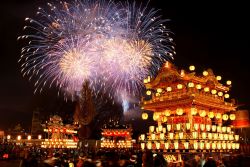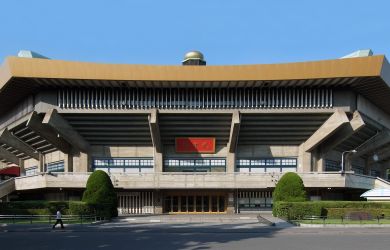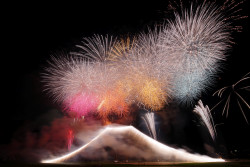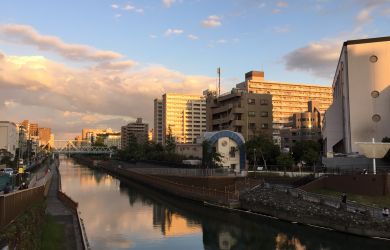
September 8, 2005
Bring it on
Peak season can’t come soon enough for hotels in southern Thailand
By Metropolis
Originally published on metropolis.co.jp on September 2005

Until nine months ago, “beachfront” and “sea facing” were two of the most enticing terms in an hotelier’s lexicon. These days, at least in Phuket, “safe distance” is more important.
Distance is certainly what saved the Twinpalms Phuket and its staff from ruin or worse when the tsunami hit on Dec 26. Set back from the beach, the just-completed hotel was untouched by the waves—physically, at least; no one was emotionally spared.
But I had been invited to Thailand not to trawl over events past, but to experience the recovery. Wherever I went, I was struck by an eagerness—urgency, almost—to look to the future. The people here know their lives won’t get better any other way. Only journalists and tourists want to know the details they’d rather forget.
That doesn’t stop one from asking. My driver from Twinpalms, Ahmed, had owned a taxi that washed away. But he was happy, he told me, because he had found a new job. In other places, the events of December were more obvious. Near Khao Lak, a large police boat lay incongruously beside the road.
“How far are we from the coast?” I asked.
“Two kilometers,” replied Pin, the cheerful guest relations office, “but please don’t look.”
The trip to Khao Lak was to check out another luxury hotel, the Sarojin, which had been due to open in the first week of January. Anticipating a busy new year, the hotel’s British owners, Kate and Andrew Kemp, had given the staff the weekend off for Christmas. No one was injured, but their hotel was ruined.
Lucky, perhaps, but one hesitates to call them or anyone else “fortunate.” Like Olivier Gibaud, general manager of Twinpalms, they are now 100 percent focused on making their business a success. “One does need luck, at times,” says Gibaud, “though we carve a niche for it to stay with us.”

With aggressive promotions and loyal customers, Twinpalms has kept its occupancy rate above 50 percent. One Australian I found floating in the hotel’s vast swimming pool had been back three times in six months. “I could wallow here all day,” he said. And he did.
After the imposing open-sided lobby, the pool is the hotel’s central feature.
Of the 76 elegantly appointed rooms, the best 15 open onto the outer lagoon, letting guests hop off their terraces straight into the water. Alternatively, Surin beach is just a short stroll away.
As befits the hotel’s location—halfway to the Chedi and Amanpuri resorts—Twinpalms is somewhere between a boutique and a five-star hotel. It’s also less than half the price of its more famous neighbors, and what it lacks in facilities it makes up for in service and style. The simple rooms are well equipped and delicately appointed, and the staff is obviously dedicated to making Twimpalms a success in the face of economic adversity.
Not yet open for a full year, Twinpalms is still carving its “niche.” In particular, it is targeting the health and detox retreat market by combining its fitness facilities with the excellent Palm Spa, and adding a juice bar, Sejuice, to create an overall “wellness” center. It has also been improving the bar and lounge areas in its destination restaurant, Oriental Spoon.
Over at the Sarojin, which is accepting reservations starting Oct 1, the Kemps’s target customers are couples seeking seclusion and luxury, with every room having its own pool, gardens or terrace. The spacious grounds open onto a white sand beach, from where guests will be able to board the Sarojin’s private boat for trips to the Similan Islands’ world-famous dive sites.
Or that’s the plan. When I visited, with reconstruction progressing well, it was hard to picture how beautiful the place must have looked on Dec 25, and how it will look next month. “Just imagine it all covered with grass,” Kate said. “It’ll be fine. We’re not worried.”
Everyone else was equally optimistic and eager to get started. Some had been working with the Kemps for more than a year, but were yet to welcome a guest, so the opportunity to practice on a real visitor was not to be missed.
Indeed, as always in this country, it is the Thais themselves who make it memorable. No matter how beautiful the beach, how delicious the food, or how elegant the hotel, the joy of Thailand is the dignity of its people. The waves couldn’t erode their seemingly boundless hospitality—and that, ultimately, is why the Kemps and Olivier Gibaud can be confident, and why tourists have nothing to fear.
Published rates (room only) at the Twinpalms Phuket start at US$130 (¥14,300) until Dec 18, US$380 Dec 19-Jan 10, and US$220 Jan 11-March 31. Check www.twinpalms-phuket.com for special offers. The Sarojin is scheduled to open Oct 1, with published rates from THB7,500 (¥20,000) until Dec 20 and THB15,500 thereafter. See www.sarojin.com for details. Thai Airways International flies direct from Narita to Phuket three times a week. Within Southeast Asia, budget airlines can cut the cost of air travel. Nok Air (www.nokair.co.th) flies from Bangkok to Phuket for as little as about THB1,000, excluding tax and other charges. Tiger Airways (www.tigerairways.com) flies from Singapore to Phuket, with fares from S$50 (¥3,300), excluding tax and other charges.
[geo_mashup_map]







